IRS
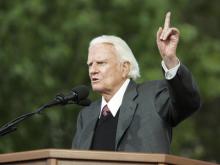
The Internal Revenue Service has reclassified one of the most famous Christian organizations, the Billy Graham Evangelistic Association.
At the request of the Graham organization, the IRS changed its tax status from a nonprofit to an “association of churches,” The NonProfit Times reported on Sept. 26. The change was made last November.
The change means the 66-year-old Christian organization no longer has to file what the IRS calls Form 990, a public statement of its financial information, including salaries for top officials. It will continue to publish an annual financial report, available to the public on its website.
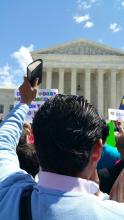
If the Supreme Court rules that there is a constitutional right to gay marriage, religious charities could be in for a big shock.
Religious people who believe in marriage as it has been for “millennia” (as Justice Kennedy put it) have lost business, lost jobs, and been sued by their own government. Those of us who support laws that protect both gay couples and religious people find these developments troubling. But if the Supreme Court rules that there is a constitutional right to gay marriage without reaffirming the rights of religious people, we will see many more situations like this.

The Internal Revenue Service said it will monitor churches and other houses of worship for electioneering in a settlement reached with an atheist group.
The settlement was reached Friday in federal court in Madison, Wis., where the initial lawsuit was filed in 2012 by the Freedom from Religion Foundation, a Wisconsin-based atheist advocacy group that claims 20,000 members nationwide.
The suit alleged the IRS routinely ignored complaints by the FFRF and others about churches promoting political candidates, issues or proposed legislation. As part of their tax-exempt status, churches and other religious groups are prohibited from engaging in partisan political activity.

A federal judge has ruled that an Internal Revenue Service exemption that allows clergy to shield a portion of their salary from federal income taxes is unconstitutional.
The clergy housing exemption applies to an estimated 44,000 ministers, priests, rabbis, imams, and others. If the ruling stands, some clergy members could experience an estimated 5 to 10 percent cut in take-home pay.
The suit was filed by the Wisconsin-based Freedom from Religion Foundation on grounds that the housing allowance violates the separation of church and state and the constitutional guarantee of equal protection. The group’s founders have said that if tax-exempt religious groups are allowed a housing subsidy, other tax-exempt groups, such as FFRF, should get one, too.
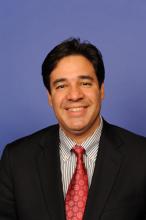
Conservatives are rallying around a House bill designed to protect religious people who advocate for traditional marriage — a belief, they say, that is held in increasing contempt.
But supporters of same-sex marriage say the bill actually protects the discriminators — individuals and nonprofits that would deny gay people benefits or services simply because they are married to a same-sex partner.
More than 60 House members — mostly (but not all) Republican — have signed on to the Marriage and Religious Freedom Act, which was introduced Sept. 19 by Rep. Raul Labrador, R-Idaho, who came to Congress in 2010 on a wave of support from the conservative Tea Party.

The federal government wants to give Annie Laurie Gaylor a tax break for leading the Freedom from Religion Foundation.
But Gaylor, an outspoken atheist from Madison, Wisc., wants to stop them — and she’s asking a federal judge for help.
The standoff is the latest twist in a court battle over the parsonage exemption for clergy, a tax break that allows “ministers of the gospel” to claim part of their salary as a tax-free housing allowance.

A commission of religious leaders has called for clarity in churches’ ability to endorse candidates and issues from the pulpit without fear of losing their tax-exempt status.
In a report sent Wednesday to Sen. Charles Grassley, an Iowa Republican who has spent years investigating the finances of high-profile televangelists, the commission called the regulation of speech of religious organizations “disturbing and chilling.”
“The IRS guidelines are very vague, so ministers and nonprofit leaders are afraid of the [appropriate] line,” said Michael Batts, the independent commission’s chairman. “We think it can be fixed without creating a monster of unintended consequences.”
The Commission on Accountability and Policy for Religious Organizations grew out of Grassley’s probe of ministry finances and makes recommendations for greater transparency and reform. It is overseen by the Evangelical Council for Financial Accountability, which was founded in 1979 as a watchdog on ethical and financial wrongdoing.
In Wednesday’s report, the commission recommended that members of the clergy should be able to say “whatever they believe is appropriate” from the pulpit without fear of IRS reprisal. Since 1954, IRS regulations allow clergy to speak out on issues but they must refrain from endorsing specific candidates.
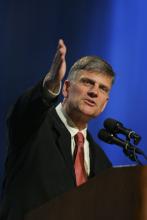
Evangelist Franklin Graham blasted the Internal Revenue Service probe of conservative nonprofit groups as “un-American,” saying both the Billy Graham Evangelistic Association and the relief group Samaritan’s Purse were audited by the IRS.
In a Tuesday letter to President Obama, Graham said the two organizations he leads were notified last September that the IRS would review their records for the 2010 tax year.
The IRS inquiry, he noted, occurred months after the BGEA ran ads in April 2012 supporting a North Carolina amendment that banned same-sex marriage, which passed in May. The BGEA also ran ads last fall urging voters to consider candidates who make decisions based on “biblical principles and support the nation of Israel.”
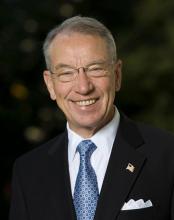
A special commission created by the Evangelical Council for Financial Accountability has called for clearer IRS guidance and greater involvement among donors to address “outliers” among congregations and other nonprofits that are not being financially accountable.
Its 91-page report was a response to a request for recommendations from Sen. Charles Grassley, R-Iowa, after he concluded a three-year investigation into alleged lavish spending by six prominent broadcast ministries in 2011.
A First Amendment watchdog group is suing the Internal Revenue Service for failing to challenge the tax-exempt status of churches whose pastors engage in partisan politicking from the pulpit.
The Freedom From Religion Foundation, which advocates total separation of church and state, filed the lawsuit Wednesday in U.S. District Court in Western Wisconsin, where the 19,000-member organization is based.
The lawsuit claims that as many as 1,500 pastors engaged in “Pulpit Freedom Sunday” on Sunday, Oct. 7, when pastors endorsed one or more candidates, which is a violation of IRS rules for non-profit organizations.
IRS rules state that organizations classified as 501(c)(3) non-profits — a tax-exempt status most churches and other religious institutions claim — cannot participate or intervene in “any political campaign on behalf of (or in opposition to) any political candidate.”
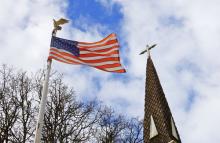
LOS ANGELES — In a matter of days, some 1,400 American pastors are planning to break the law.
And they’re likely to get away with it.
As part of “Pulpit Freedom Sunday,” on Oct. 7, religious leaders across the country will endorse political candidates — an act that flies in the face of Internal Revenue Service rules about what tax-exempt organizations, such as churches, can and cannot do.
The IRS says tax-exempt organizations, or what they refer to as a 501(c)(3), are prohibited from participating in partisan campaigning for or against political candidates. Yet, despite what’s in the rules, the agency continues to struggle to do anything about those who defy the law.
Though the regulation has been in place since 1954, in 2009, the U.S. District Court of Minnesota ruled the IRS no longer had the appropriate staff to investigate places of worship after a reorganization changed who in the agency had the authority to launch investigations.
New procedures for conducting church audits have been pending since 2009, which has left the IRS virtually impotent in conducting any kind of new investigations. The IRS did not respond to questions seeking comment.

ST. LOUIS — Don Hinkle stands out among the serious, conservative men of the Missouri Baptist Convention. Not that Hinkle isn't conservative or serious. He is both. But Hinkle prefers bow ties, which — along with his white, furry mustache and thatch of white hair — give him a sort of plump Mark Twain air.
Late last week, a church-state watchdog group in Washington filed a complaint with the Internal Revenue Service accusing Hinkle, who is also his organization's director of public policy, with violating federal tax law by intervening in two campaigns for public office.
Those were the Republican primary campaigns of U.S. Rep. Todd Akin for U.S. Senate, and Ed Martin for Missouri attorney general.
The 500,000-member Missouri Baptist Convention is the state arm of the Southern Baptist Convention, the largest Protestant denomination in the country, with about 16 million members.
In his column in the May edition of the Pathway, the state convention's newsjournal, Hinkle wrote that while he did not want an American theocracy, "when it comes to public policy, Southern Baptists must be motivated by love for our fellow citizens, believing that God's way is the best way."
For that reason, Hinkle continued, "I personally support candidates like U.S. Rep. Todd Akin, a Republican who wants to challenge Democrat Claire McCaskill for her U.S. Senate seat, and Republican Ed Martin, the St. Louis attorney who is running for state attorney general."
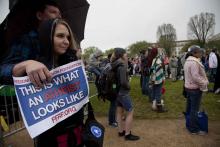
How much money does the U.S. government forgo by not taxing religious institutions? According to a University of Tampa professor, perhaps as much as $71 billion a year.
Ryan Cragun, an assistant professor of sociology, and two students examined U.S. tax laws to estimate the total cost of tax exemptions for religious institutions — on property, donations, business enterprises, capital gains and “parsonage allowances,” which permit clergy to deduct housing costs.
Their article appears in the current issue of Free Inquiry magazine, published by the Council for Secular Humanism, an organization of nontheists. U.S. tax law grants religious groups and other nonprofits the exemptions because of their charitable nature.
And while the authors do not claim theirs is a comprehensive or unbiased appraisal, their findings have raised eyebrows in the nontheist community, which has long sought to eliminate the tax exemptions on the grounds that they unfairly favor religious institutions.

Most people with some sense of universal human dignity have found the screed Pastor Charles Worley issued against the GLBT community from the pulpit recently repugnant. As a Christian who tires of being lumped together with such hateful, violent voices cloaking themselves within the protection of their faith, I can say with confidence that there is nothing about Worley’s rhetoric that is Christian, as I understand it.
But some believe he did more than just smear the image of the Christian faith and denigrate an entire cross-section of the population; some suggest he actually broke the law from the pulpit.
Americans United for Separation of Church and State‘s Barry W. Lynn submitted a letter to the Internal Revenue Service arguing that Worley violated his church’s 501(c)3 nonprofit status by interfering in an election while speaking on behalf of his church.
FoxNews shuns pro-immigrant voices. How do we repair souls returning from the war? Does Christianity translate into public policy? Lobbyists role in 2012 fundraising. Oakland mayor promises "minimal police presence" at OWS protests. Cain says he doesn't need to know foreign policy details. And only 40 percent of Americans correctly identify Romney as Mormon.
Wall Street has been devastating Main Street for some time. And when the politicians -- most of them bought by Wall Street -- say nothing, it's called "responsible economics." But when somebody, anybody, complains about people suffering and that the political deck in official Washington has been stacked in favor of Wall Street, the accusation of class warfare quickly emerges. "Just who do these people think they are," they ask. The truth is that the people screaming about class warfare this week aren't really concerned about the warfare. They're just concerned that their class -- or the class that has bought and paid for their political careers -- continues to win the war.
So where is God in all of this? Is God into class warfare? No, of course not. God really does love us all, sinners and saints alike, rich and poor, mansion dwellers and ghetto dwellers. But the God of the Bible has a special concern for the poor and is openly suspicious of the rich. And if that is not clear in the Bible nothing is.
In the face of state and federal budget cuts, many of us have been fasting and contemplating the question: "What would Jesus cut?" In light of tax day, however, we might equally contemplate: "What would Jesus tax?"
After all, a great deal of our budgetary stress is the result of declining revenue, thanks to the economic downturn and decades of tax cuts.
A new report that I co-authored, "Unnecessary Austerity," argues that before we make draconian budget cuts at the federal and state level, we should reverse huge tax cuts for the wealthy and tax dodging corporations.
The Jesus I know would be concerned about the extreme inequalities of wealth and power that have emerged in our communities. He would rail against principalities and powers that rig the tax rules so the privileged pay less.
He would lament the destruction of God's creation through excessive consumption and pollution. And, he would be alarmed about financial and commodity speculation driving up the cost of food and worsening hunger. (In today's world of high finance, someone would be hedging investments on how quickly Jesus could multiply loaves and fishes.)